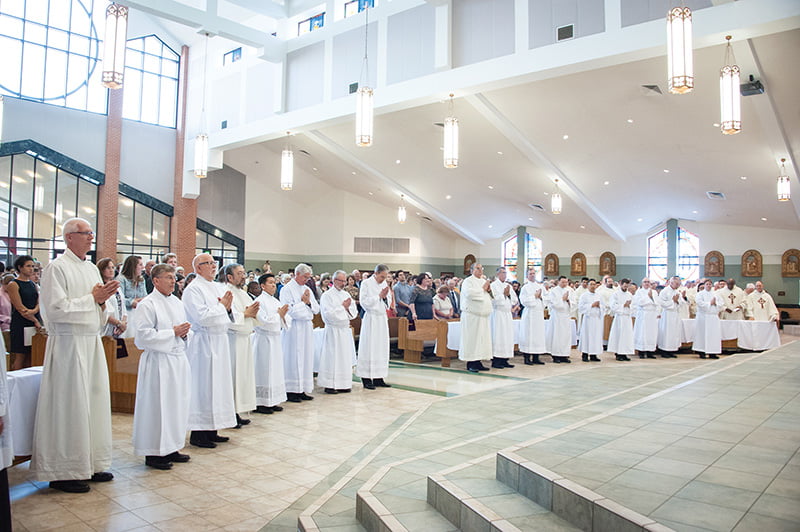
Seventeen new permanent deacons were ordained for the Archdiocese of Kansas City in Kansas by Archbishop Joseph F. Naumann on June 3 at Prince of Peace Church in Olathe. LEAVEN PHOTO BY LORI WOOD HABIGER
by Joe Bollig
joe.bollig@theleaven.org
OLATHE — It wasn’t that becoming a permanent deacon was a strange idea for Deacon Brad Sloan, a member of Mother Teresa of Calcutta Parish in Topeka.
Rather, it wasn’t an idea at all. He wasn’t even looking for it.
“It’s not something that I would have ever chosen for myself,” he said. “In fact, it was the furthest thing from my mind when it was suggested by my spiritual director that I look into it.
“My natural reaction was, ‘No, you’ve got the wrong guy.’”
Nevertheless, about five years after his spiritual director raised the possibility of him becoming a cleric, he joined 16 other men to be ordained a permanent deacon by Archbishop Joseph F. Naumann on June 3 at Prince of Peace Parish in Olathe.
What a long, strange journey it had been.
The 17 new permanent deacons are the second “cohort,” or group, to be ordained for the Archdiocese of Kansas City in Kansas. They join the members of the first cohort ordained in 2011, and other permanent deacons who were ordained elsewhere but moved into the archdiocese.
Despite having apostolic origins, the clerical office of deacon is still unfamiliar to many Catholics.
Although the establishment of the diaconate can be found in the Acts of the Apostles, the office slowly disappeared until it became a temporary state before priestly ordination. Pope Paul VI restored the permanent diaconate in 1967.
Catholics, who had been used to transitional deacons and celibate priests, were a little confused by the advent of permanent deacons with wives and children.
The unofficial and erroneous term “lay deacon” arose. Actually, permanent deacons are no longer laity but members of the three ranks of clerics, which are deacon, priest and bishop.
“Part of this confusion, this misnomer of ‘lay deacons,’ results from the fact that most permanent deacons — as evidenced by our 17 candidates today — are married,” said Archbishop Naumann in his homily.
“Part of the impetus for the reestablishment of the permanent diaconate,” he continued, “while maintaining the importance of the charism of celibacy for priests . . . was to create a new cadre of clergy who could be married and would spend a significant or majority of their lives fulfilling their family responsibilities.”
Members of the second cohort gave different reasons for wanting to be a deacon.
Some, like Deacon Sloan, felt they were called. Others, like Deacon Tim Ruoff, described it as being “led by the Lord.” Deacon Ralph Schramp wanted to “give something back to the church.” Deacon Marcos Navarro saw the ministry of service done by permanent deacons as a continuation of his life and something he’d like to do.
“I was in [the] seminary and discerning the priesthood from 2005 to 2007, and I remember [discerning] that even though I wasn’t called to the priesthood, he was calling me to ministry in the church,” said Deacon Nicholas Moragues, a member of Good Shepherd Parish in Shawnee and director of formation there.
“Over the years, as I’ve taken on different ministerial roles . . . I had a real desire to serve in a capacity that would allow me to have the backing of the sacrament of holy orders,” he continued. “I found that everything the diaconate is and does is much of what I was already doing. I see it as a strengthening of the service I’m already called to.”
As aspirants and then candidates, the newly ordained deacons faced many challenges along the way.
Deacon Joe Allen and others mentioned the challenge of balancing the demands of family, work and formation. Deacon Navarro spoke of his worldview and mindset changing from a secular to a spiritual focus. Deacon Schramp talked about learning new disciplines of a more rigorous prayer life. And Deacon Moragues mentioned the long period of formation and rigor of the academic aspect.
“Probably my greatest [challenge] was that I didn’t feel worthy of the call,” said Deacon Sloan. “But because I have a good spiritual director and a good prayer life, the Lord is with me all the time. I firmly believe he’ll give me the strength to face [future] challenges.”
Just before their ordinations, the 17 men received their first assignments as permanent deacons.
As expected, their ministries will involve various forms of service. Many will also be proclaiming the Gospel and preaching at Mass, performing baptisms, preparing couples for marriage, and presiding at marriages and funerals without a Mass.
“To be a deacon is to [manifest] the service of Jesus Christ,” said Deacon Allen. “You’re not a government social worker helping with social programs. You’re there on behalf of Jesus Christ and the church to help people not only physically, but spiritually, to help bring them to Jesus Christ through service.”






